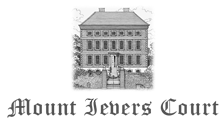George Ievers of Athlacca
George Ievers was the sixth and youngest son of Henry and Elizabeth Ivers. His father died in 1691 and George appears to have inherited lands in Co. Limerick at Cragbeg (just west of Limerick City, beside Clarina village and the ruins of Carrigogunnell Castle) and Athlacca (midway between Adare and Kilmallock, near the Morningstar river). Eyre H. Ievers says he later lived at Ballylusky.[i] He married a daughter of Robert Seward of Co. Cork, with whom he is believed to have had at least five sons.
George appears to have died before 7th May 1747, the day his second son George became a Freeman of Limerick. Robert Ievers would go on to establish the family branch at Castle Ievers and we shall return to him presently.
GEORGE IEVERS & THE AUSTRALIAN CONNECTIONS
George’s second son and namesake George Ievers married Anne Gubbins, daughter of Launcelot Gubbins of Maidstown Castle. Originally known as Ballyvenoge, Maidstown Castle stands between Kilmallock and Bruree. Anne’s sister Dorca was married to Sir Christopher Knight of Brickfield, near Kilmallock, who served as Mayor of Limerick City. Also of influence was Anne’s uncle General Lord Blakeney who was destined to become a hero of Britain for overseeing the spirited (but doomed) defence of the island of Minorca in 1761.
George became a Freeman of Limerick on 7th May 1747. With an address at Maidstown, he was amongst the 496 potential Freeholders of County Clare named on a list in 1768, claiming 40 shillings on lands at Ballylidane West.[ii] An X beside his name indicates that - like his cousins John Augustine Ievers of Mount Ievers and Henry Norton Ievers of the City of Bath – his name was crossed out on the original.
George and Anne’s only son Lancelot Ievers married Frances, daughter of Colonel Hawkins of Killaloe.
Their eldest son George Hawkins Ievers (d. 1820) was a wholesale wine merchant based in Limerick and a prominent member of the Limerick Mercantile Society. On 18th February 1812, G. H. Ievers was married in St. Michael’s Roman Catholic Church, Limerick, to Margaret O’Shaughnessy. She was a niece of the Roman Catholic Bishop of Killaloe and a sister of Mrs. George Bolster. G. H. Ievers was made a Freeman of Limerick on 12th October 1818. He died less than two years later and was buried at Killaloe on 9th June 1820.[iii]
George and Margaret’s older son George Hawkins Ievers (1813-1864) had family in Colorado, Virginia and New York, while their younger son William Ievers (1818-1901) left the Merchant Navy to found William Ievers & Son in Melbourne in 1859. See http://adb.anu.edu.au/biography/ievers-george-hawkins-3921 for a look at this colourful family member.
George and Anne Ievers also had a daughter Anna Maria who was married in October 1799 to John Bolster of Tullaboy and had issue.
HENRY IEVERS, BARRISTER
George’s second son Henry Ievers of Athlacca served as a Captain in the Oxford Light Dragoons before becoming a barrister at the English bar. He died unmarried at Kentish Town in London in December 1801.[iv]
ANTHONY IEVERS, CLERK
George’s third son Anthony served as a clerk to Benjamin Johnson, Public Notary, of Castle Street, Dublin. On 17th September 1754, he was witness to the will of the bachelor Sir Charles Moore, 4th Bart, of Rosscarbery, Co. Cork, and keeper of the records at Birmingham Tower in Dublin Castle. Sir Charles committed suicide three weeks later, apparently on account of a possible scandal over his homosexual tendencies.
There are records of a Rebecca Ievers, ‘widow of late Anthony Ievers, formerly of Boherbuoy, (kenry), Co. Limerick’ who died in Limerick on 24th October 1806.
It is possible that he was also the ‘Anthony Ivers’ [sic], described as gentleman and son-in-law of the late Thomas Dunn, who was made a Freeman of Limerick on 29th June 1785.
JOHN IEVERS OF MONGBOY
Although Burke’s Landed Gentry of Ireland does not list him, the fact that John Ievers of Mongboy was made a Freeman of Limerick City on the same day as Robert Ievers of Ballylusky suggests he was probably a brother and thus another son of George. He may have been disinherited for marrying a Catholic.
The aforementioned list of 496 potential Freeholders of County Clare from 1768 records that John Ievers of Ieverstown claimed a £10 freehold over lands at Mungboy [sic]. However, there is an X beside his name, indicating that his name was crossed out on the original list, and a note alongside records that ‘Sir Lucius [presumably Sir Lucius O’Brien, MP for Ennis and Clare at the time the Freeholders list was compiled] objected agt. John Ievers as married to a papist wife & outlawed, this objection reserved to the consideration of the scruteney & vote then allowed???’
John Ievers’ son Henry Ievers of Mohane was made a Freeman of Limerick City on 11th May 1762. Henry’s sister Margaret married Matthew Hickey, attorney, Sixmilebridge, who died in 1763.
It is possible that this was the branch of the family who became embroiled in a deadly family feud with the Wilsons in the 1770s. I quote the following from page 178 of James Kelly’s book ‘That Damn'd Thing Called Honour: Duelling in Ireland, 1570-1860’ (James Kelly, Cork University Press, 1995) which is itself based on a report in Finn's Leinster Journal of 29th March 1778:
‘When John Wilson exchanged shots without effect with Henry Ivers at Sixmilebridge, County Clare, in March 1778, the two men were persuaded to conclude the encounter, honour intact, by some local gentlemen; but when the Ivers's party was leaving the scene, Henry was mortally wounded and his brother John shot dead by an assailant who fired from Henry Wilson’s (John Wilson’s brother’s) house. This was clearly a case for the authorities; for whatever the disinclination of the legal authorities to prosecute duellists, they could not ignore murder’.
